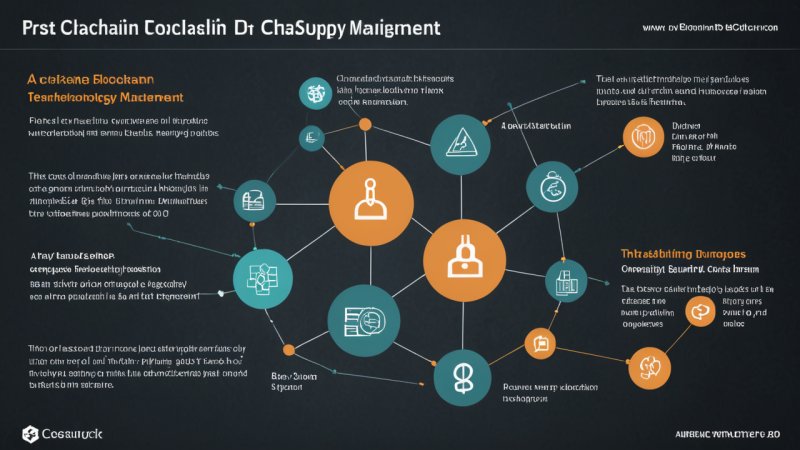In an era where transparency, efficiency, and security are paramount, blockchain technology is emerging as a game-changer for supply chain management. This innovative technology, originally designed to support cryptocurrencies like Bitcoin, is now being harnessed to streamline and enhance various aspects of supply chains across industries. By providing a decentralized and immutable ledger, blockchain offers unprecedented opportunities to track products, verify transactions, and foster trust among stakeholders. As businesses grapple with the complexities of global supply chains, the adoption of blockchain technology is not just a trend but a necessity for staying competitive in the marketplace.
The Basics of Blockchain Technology
Blockchain technology is fundamentally a distributed ledger system that records transactions across multiple computers in such a way that the registered transactions cannot be altered retroactively. This ensures that the data remains secure and transparent. Each block in the chain contains a number of transactions, and every time a new transaction occurs, it is added to the block. Once the block is filled, it is linked to the previous block, creating a chronological chain of blocks—hence the name 'blockchain'. This technology is not only secure but also allows for real-time tracking of goods, which is crucial in supply chain management.
Enhancing Transparency and Traceability
One of the most significant advantages of blockchain in supply chain management is its ability to enhance transparency. Every participant in the supply chain can access the same information regarding the movement of goods. This means that manufacturers, suppliers, distributors, and retailers can all see the same data, which reduces the chances of fraud and errors. For instance, in the food industry, blockchain can track the journey of a product from farm to table, enabling consumers to verify the origin and quality of their food. This traceability is not only beneficial for consumers but also helps companies comply with regulations and standards.
Improving Efficiency and Reducing Costs
Blockchain technology can significantly improve the efficiency of supply chains by automating various processes. Smart contracts—self-executing contracts with the terms of the agreement directly written into code—can streamline transactions and reduce the need for intermediaries. For example, when a shipment is delivered, a smart contract can automatically release payment to the supplier, eliminating delays and reducing administrative costs. Additionally, the decentralized nature of blockchain reduces the reliance on a central authority, which can often be a bottleneck in traditional supply chain systems.
Fostering Trust Among Stakeholders
Trust is a critical component of any supply chain. With multiple parties involved, it is essential to ensure that everyone is operating with accurate and reliable information. Blockchain fosters trust by providing a single source of truth that is accessible to all stakeholders. Since the data on the blockchain is immutable, once a transaction is recorded, it cannot be changed or deleted. This feature is particularly valuable in industries like pharmaceuticals, where verifying the authenticity of products is crucial. By ensuring that all parties have access to the same information, blockchain can help to build stronger relationships between suppliers, manufacturers, and consumers.
Challenges and Considerations
Despite its many advantages, the implementation of blockchain technology in supply chain management is not without challenges. One of the primary hurdles is the integration of blockchain with existing systems. Many companies operate on legacy systems that may not be compatible with blockchain technology. Additionally, there is a need for industry-wide standards to ensure interoperability between different blockchain systems. Furthermore, while blockchain offers enhanced security, it is not immune to cyber threats. Companies must remain vigilant and invest in robust cybersecurity measures to protect their data.
Future Trends in Blockchain and Supply Chain Management
The future of blockchain technology in supply chain management looks promising. As more companies recognize the potential benefits, we can expect to see increased investment in blockchain solutions. Moreover, the rise of the Internet of Things (IoT) is likely to complement blockchain technology, enabling even greater visibility and automation in supply chains. For instance, IoT devices can provide real-time data on the condition and location of goods, which can be recorded on the blockchain for enhanced traceability. Additionally, as sustainability becomes a focal point for consumers and businesses alike, blockchain can play a role in tracking the environmental impact of products throughout their lifecycle.
Conclusion
Blockchain technology is poised to revolutionize supply chain management by enhancing transparency, improving efficiency, and fostering trust among stakeholders. While challenges remain in terms of integration and security, the potential for blockchain to transform the way businesses operate is undeniable. As more organizations adopt this technology, we can expect to see a more streamlined, secure, and sustainable approach to supply chain management that benefits not only businesses but also consumers and the environment.






